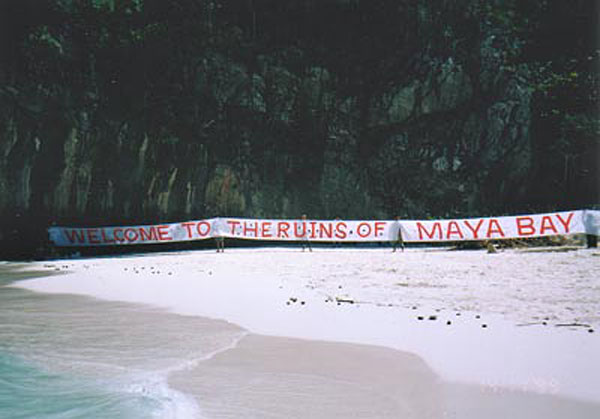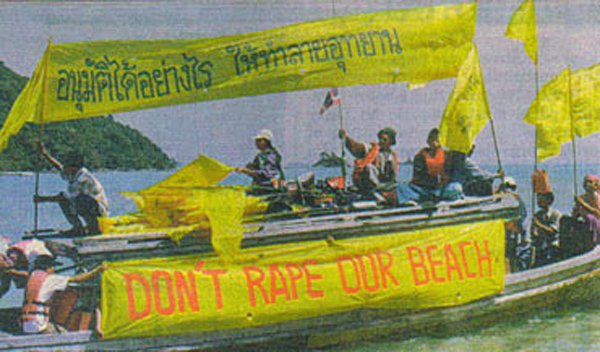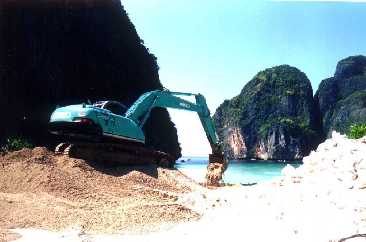
The Beach - Countdown To Doomsday
Filmmaker and writer, Neil Goodwin, reveals how Leonardo DiCaprio's latest Hollywood offering has ripped up paradise.
February 2000 / Squall Download 3, March/April 2000, pp. 17-19.
Like most Brits, I first read about the controversy surrounding the filming of Alex Garland's best seller 'The Beach' in The Guardian. 'DiCaprio film rips up paradise Thai beach' ran the headline beside an exquisite picture of Maya Bay on Phi Phi Le Island, the chosen location for 20th Century Fox's £40 million adaptation. Its British film crew, headed by Andrew Macdonald and Danny Boyle of 'A Life Less Ordinary' fame, had enraged local environmentalists by sacrificing one of Thailand's most protected and beautiful beaches to the Great God Box Office.
Hollywood's perception of an idyllic tropical hideaway had no room for endangered plant species such as the Giant Milkweed and Spider Lilly, integral parts of the Bay's natural defence against sea erosion. These were scrubbed up and removed to a nursery; the plan being to piece the fragile Eco-system back together again like so much Lego once the shoot was completed. In came 60 alien palm trees. In came the bulldozers to level a 100-yard stretch of sand dune for a pivotal football match scene.
As I sat there reading how local environmentalists, wearing DiCaprio masks, occupied one of Thailand's most beautiful National parks to prevent it from being turned into a travel agent's beach fantasy, I'm thinking: Are you sure you mean Alex Garland's 'The Beach'? You know, the best seller that on one level could be read as a critique of mass tourism and the commercial vandalism that it brings to the world's most beautiful locations? It just couldn't be.
"There's no way you can keep it out of the Lonely Planet, and once that happens, it's countdown to doomsday." (The Beach by Alex Garland)
Time for a little digging of my own, I thought. In order to film on Phi Phi Le Island, Fox, well let's just say 'benefited' from a loophole in Thai law. Normally, productions are only granted permission to film in a Thai national park if they satisfy all of the requirements of Article 16 of the National Park Act (1961). The act was put in place "to protect and conserve existing natural resources so that they remain in their original state, not to be destroyed or changed, for the continuing benefit of the state and the people' However, Fox discovered that Article 19 of the National Parks Act (1962) allowed them "to decorate the site of Maya Beach and to plant coconut trees in order to support officials in the improvement of a tourist attraction".

Smoothing the way further, Fox agreed to put up a US$250,000 bond to the Royal Forestry Department (RFD), against any negative environmental impacts directly caused by filming on the island, and offered to donate US$108,000 to the RFD for them to spend on environmental projects. Enter a US$10 million boost to the local economy, and plenty of short-term employment opportunities, and Article 16 was history.
The film crew went ahead with its 'perfect beach' and Leonardo "I consider myself an environmentalist" DiCaprio flew in to begin work on the film early last year.
'As promised, the film crew tried to return Maya Bay to its original pristine condition by removing the coconut trees, replanting native plants and dotting the beach with bamboo stakes to hold the sand dunes in place,' says Pennapa Hongthong, The Nation's environmental correspondent in Bangkok. 'But the scene is far from natural. Native plants like the Giant Milkweed, Sea Pandanus and Spider Lilly, which were removed from the beach in a nursery for months, were unable to survive as their roots were cut. The glistening white sand, which once attracted tourists, was swept away by storms because there were no plants to hold it in place. The fences of bamboo, which the film crew put in place, were not a suitable replacement.'

To be fair to Fox, there does appear to be plenty of evidence to suggest that the filmmakers have gone to unprecedented lengths to leave Maya Bay just how they found it. And, with a quirky twist on the book's Ganja growing subtext, the strong likelihood that some of the local opposition has been stirred up by those keen to protect a lucrative trade in bird's nest soup (Maya Bay's steep cliffs provide an ideal nesting ground for swallows) from death by tourism.
But whatever the true extent of the damage, and readers can view progress reports by logging on to www.uq.edu.au/~pggredde * and www.thaistudents.com/thebeach *, surely the desire of many thousands of backpackers to retrace Leonardo's footsteps once the film goes on general release, will unleash an irresistible tide of environmental degradation onto that island. The production's Thai co-ordinator, Santa Pestanij, has already envisaged "the creation of a new tourist attraction". Indeed, latest reports coming into SQUALL testify to the appearance of hundreds of posters on the island and in surrounding areas announcing a 'DiCaprio Tourist Trail'. And for this, shouldn't we hold 20th Century Fox and the future hype surrounding its 'star vehicle' at least to some extent responsible?
Such has been the fate of Khao Phing Kan island or, as the tourists like to call it, "James Bond Island", the location where Christopher Lee and Roger Moore had their showdown in 'The Man with the Golden Gun' some 25 years ago. Today it is jam-packed with 52 souvenir stalls, all of them selling the same cheap trinkets. In one corner is a small toilet block. Every day a large flotilla of long-tailed boats disgorges thousands of backpackers. Every day hundreds of couples stand back to peeling back with dueling fingers raised (she Scaramanga, he Bond), the rocky outcrop of Tapu Island, where the Man with Three Nipples concealed his deadly ray gun, slumped in the background. As Richard, The Beach's central character put it "If these assholes ever found out about our island they'd take just one night to spoil it."
Unfortunately, an advanced guard of backpackers has already begun to find out about Phi Phi Le (or 'Phi Phi Leo' as it is starting to become known). Day-trippers are being lured away from neighbouring Phi Phi Don, with its dozens of bungalows, cafes, shops, exchange booths and hotels, by local tour operators keen to cash in on the movie. Visitors will soon be able to wade ashore wearing Top Man and Top Girl's much anticipated 'The Beach' range, and pause awhile to take in Leo's spoken vocals on 'Beached', a new track by ORBITAL.
So now that it appears that the 'countdown to doomsday' has finally begun, what are we supposed to make of this Eco-war torn production? As we enter the 21st Century and begin to face up to the challenge of protecting what little remains of the planet's pristine wilderness from the ravages of corporate greed (logging, oil exploration, mass tourism etc. etc.), one would hope that the very idea that a film studio can dismantle parts of a precious natural habitat in the name of entertainment would send alarm bells ringing in cinemas across the world. (Fox's Beach excursion has certainly alarmed the world of movie making. According to Santa Pestonji, at least six other foreign productions have switched location from Thailand to Australia or Malaysia to avoid similar controversy).
No doubt to many a young girl, the temptation of seeing Leo in the raw will be impossible to resist. But I would hope that for the rest of us (the inquisitive ones who thought the book was reasonably hip and now wonder whether DiCaprio's gone and made a pig's ear of Richard), we go with our conscience and boycott the thing. Or at the very least, watch it round a mate's house on TV in about five year's time.
The Beach opened in London on February 11.
Links
http://www.uq.edu.au/~pggredde *
http://www.thaistudents.com/thebeach *
* Wayback Machine link
